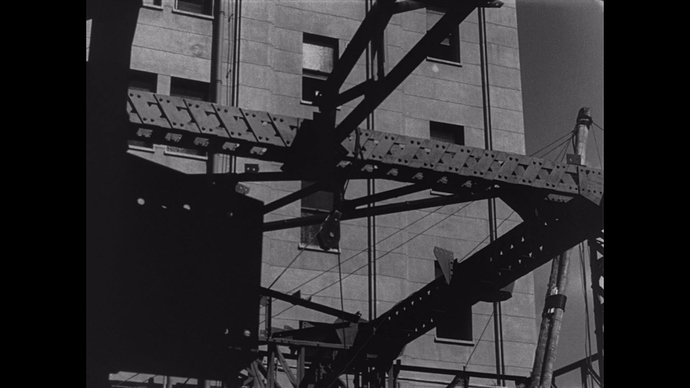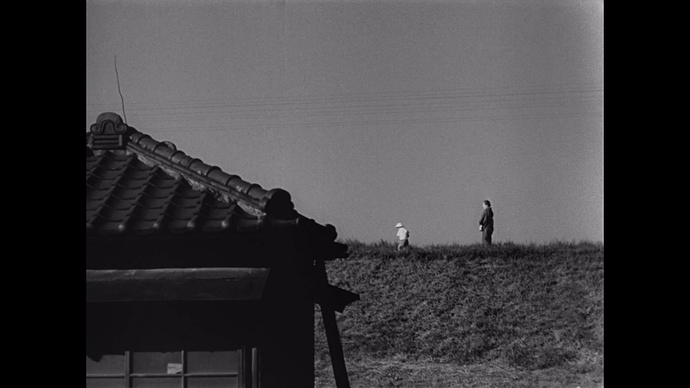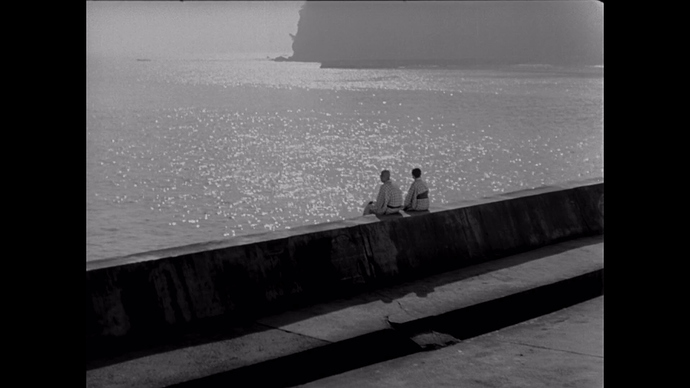I didn’t notice it, but @Navaronegun made me realize yesterday I was coming to the movie differently than the first-time watchers (doh!), having already seen it multiple times a long time ago, but thus being familiarized with the plot, and thus the reveals were not reveals at all to me.
I apologize if this isn’t very constructed or intelligible (as usual for me, cough). But I had kept only four notes, and watched the movie two weeks ago, so I’m going ad-lib!
That was a great read, @Rock8man, and I am very glad you shared (at the last minute, like in the movie!) the reveal of what the movie meant for you in the physical world.
But as my namesake implies, I shall be the “half-empty” to your “half-full”!
Ozu is a very dark director. And this is probably his darkest movie. Usually, his darkness is packed with comedy (or even fart jokes), as it is very polite to smile at the face of despair, but I thought that Tokyo Story was dark through and through.
It showed selfish people, and how everybody is, no exception. Sure, the partly westernized in their attitude Japanese are openly selfish, or should I say self-involved, but so are Noriko and the father — maybe to an even greater extent.
The father takes advantage of being half-drunk, the only occasion you are socially allowed to express yourself without too much a restraint in Japan, to infer how inappropriate he thought the way he was hosted for his trip was. Him having had a terrible night before at a beach resort hotel, one may think it is related to that, but he states how disappointed he is of the social situation of his son, even that he feels this son is a failure, as is supposedly apparent in the popular neighbourhood his house is located. He strikes me as the ultimate selfish character, one who is not only self-involved, but thinks others should dedicate themselves to his splendour — and oops, I’m home, let me puke on your tatami.
Noriko, the central attraction, shows a proper, expected face most of the movie. Is she doing it out of respect, or because of social obligations toward one’s elders? Or could it be guilt, after what is revealed with her talk with the mother, or even that she sees sparks of her beloved husband in his progenitors? We could be left wondering, but she takes on herself to spill all out the fact she only really wants to think of herself, yet isn’t allowed because of her social statute, and the slight side issue that she has been utterly ravaged and destroyed by the war. What does she really think? I was left being sad for her, somewhat terrified of her, a bit outraged by her. How amazing that the person that is this plain, obedient nursing woman most of the movie is its biggest mystery, even after watching it so many times.
The only exception maybe the mother, who isn’t overtly selfish, but the comment might be that she was the only one not to take a spot to express herself, and that the patriarchal society won’t offer her such an occasion.
The usage of fans was an interesting way to display selfishness: quickly flapping moves destined at one’s face for more, then Noriko slowly moving the air toward her in-laws at dinner, while not eating herself.
Probably some Western commentator has reflected about how all those characters may be allegories for the Japanese society of the time (as with about any Ozu movies, I guess), but I dislike that sort of weighted attitude, especially since it is my opinion that Japanese society hasn’t changed that much and is still caught in a time capsule. But I also don’t think that was the intent of the director at all, who has always seemed focused on depicting characters.
On that front, sadly, I think he is let down because the acting is very questionable. Japanese acting is almost always supposed to feel fake, because it is partly what is expected of it, but I think that it is also because of the will to convey emotions the Japanese people are used to hide. Most actors just cannot. I prefer Ozu’s silent movies for that reason as, at least, exaggerated acting is expected back then. But in Tokyo Story, the terrible acting of a lot of the parts was really troubling me. Some actors even felt like they didn’t really understand their characters (the father or the youngest son, for instance).
Ozu probably invented the “vegetable posing” of actresses — the awkward filming of a woman who stares at a camera, swaying and smiling in a not particularly smart way — which is still so popular nowadays in Japan. I dislike it, but to his credit, there is nothing voyeur-ish in the way he does it — and the males are sometimes subjected to it as well. While Setsuko Hara isn’t a really good actress, in my opinion, in her routine, she obviously gets what Ozu wants, and the way she delivers some horrible lines (the most obvious one being “Human exchanges/Life/Times/Society is horror,” delivered casually and with a smile to the youngest daughter) makes me more sympathetic of her.
Having spent a lot of my life in Japan now, this was very interesting as a time piece as well. Some of the old, “literary”, Japan’s artefacts (before the 1946 massacre simplification of the language) can still be seen (the Hiroshima writings in the stations for instance). It can also be felt in some of the dialogues, who are little pieces of beauty (“I’ve decided not to grow old.”, which is probably a lame sounding translation).
The Noriko character had perhaps a shocking value when I watched it before (I remember wondering how someone could be so broken). I am in a very dark place of my life, and I couldn’t help but agree with her pessimistic way of seeing life now.
Noriko has always been one of my favourite Japanese names, from as long as I can remember. Uh, that’s funny now that I think about it.
Baring midsummer and midwinter, you always should have an umbrella with you in Japan.
It really didn’t change much, if at all, in my experience.


